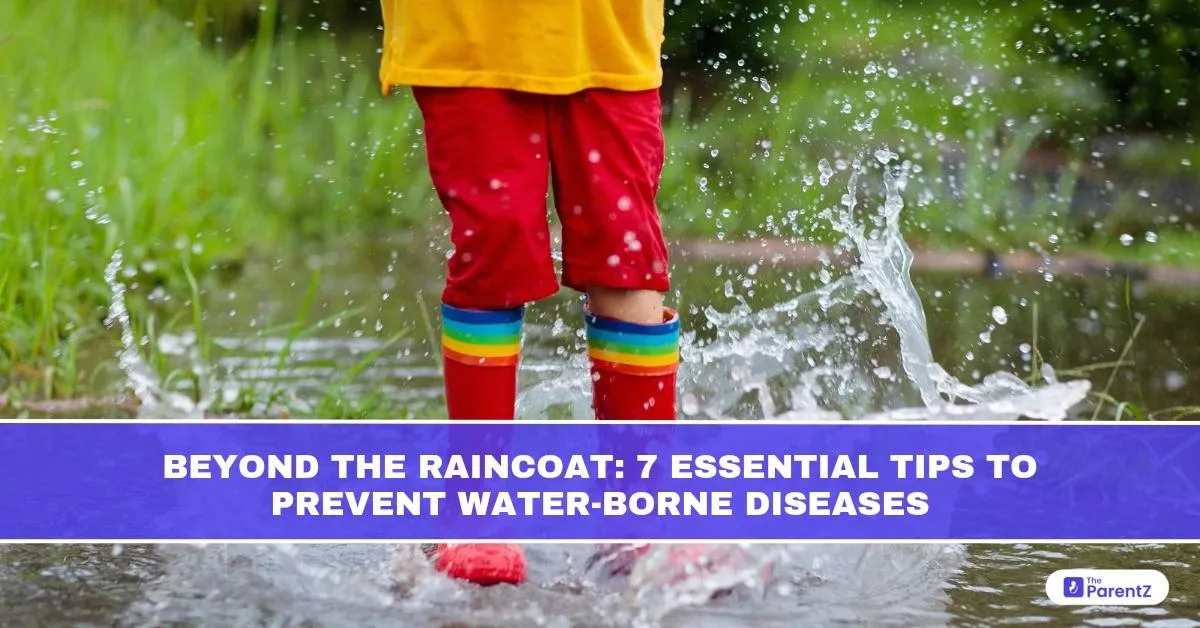Puddles, paper boats, and the smell of wet soil. Monsoon holds a special charm for children. But beneath the surface lies a seasonal surge in water-borne diseases that disproportionately affect young kids. From acute diarrhea to hepatitis A, contaminated water and poor hygiene can trigger infections that quickly escalate in children under 10.
According to the Indian Academy of Pediatrics and WHO, monsoon-linked diseases like cholera, typhoid, and amoebiasis remain a major cause of morbidity among Indian children. The good news? Most of these illnesses are preventable with basic hygiene and timely precautions.
1. Boil or Filter All Drinking Water
Unsafe drinking water is the most common cause of illness. Municipal supplies may get contaminated during the monsoon due to pipe leakage or backflow from drains.
What to do:
- Always boil water for at least 10 minutes before consumption if unfiltered
- Use NSF-certified filters (UV + UF + RO) to eliminate bacteria, viruses, and parasites
- Store drinking water in clean, closed containers
- Avoid cold water from outside vendors or street stalls
Clinical note: Diarrheal diseases such as cholera, giardiasis, and E. coli-related infections spread rapidly through untreated water.
2. Say No to Raw or Street Foods
During the monsoon, the risk of food contamination multiplies, especially when sold in the open. Street foods often use unclean water to prepare chutneys, wash vegetables, or make ice.
Safer choices:
- Avoid raw salads and cut fruits from stalls
- Do not let children consume pani puri, ice gola, or fruit juices from roadside vendors
- Ensure freshly cooked, hot meals at home, especially for school-going kids
Parent tip: Even if it looks hygienic, the risk lies in hidden water used in washing or diluting ingredients.
3. Maintain Hand Hygiene Religiously
Children touch everything, muddy shoes, public benches, wet swings and then eat with the same hands. This makes hand hygiene non-negotiable.
Tips for parents:
- Teach children to wash hands with soap for at least 20 seconds
- Key moments: before meals, after using the toilet, and after coming back from outside
- Use alcohol-based hand sanitizers when water isn’t available (e.g., in school)
Medical insight: Hepatitis A and typhoid are fecal-oral transmission illnesses, often caused by poor hand hygiene.
4. Keep Feet Dry and Clean
Wet shoes, socks, and feet become breeding grounds for fungal infections and leptospirosis, especially in flood-prone areas.
Foot care strategy:
- Ensure children wear waterproof sandals or floaters, not canvas shoes
- Dry feet thoroughly and apply antifungal dusting powder (as per pediatrician’s advice)
- Wash and sun-dry footwear regularly
Extra care: If your area is flooded, avoid letting children wade through water even with boots. Leptospira bacteria can enter through skin cuts.
5. Vaccinate On Time
Some water-borne diseases are entirely vaccine-preventable. Make sure your child’s immunization chart is up-to-date, especially with the following:
- Typhoid Conjugate Vaccine (TCV) – recommended from 9 months onwards
- Hepatitis A vaccine – two doses starting at 12 months
- Rotavirus vaccine – in infancy (as per national immunization schedule)
Consult your pediatrician for catch-up doses if any vaccines have been missed.
6. Use Clean Water for Brushing and Bathing
Even when drinking water is safe, children are still exposed during daily activities.
- Use boiled or filtered water for brushing teeth, rinsing mouth, and preparing baby formula
- Avoid bathtubs or playing in stored water unless it’s cleaned and changed daily
- Ensure storage tanks are sealed and cleaned periodically to avoid mosquito and bacterial contamination
7. Watch for Early Warning Signs
Even with all precautions, children can still fall sick. Catching symptoms early prevents complications.
Red flags to never ignore:
- Loose stools or vomiting lasting more than 12 hours
- Fever above 101°F, especially with abdominal pain
- Reduced appetite, excessive thirst, or signs of dehydration
- Yellow eyes or urine, suggestive of hepatitis
- Rashes or red eyes after exposure to stagnant water (possible leptospirosis or conjunctivitis)
Seek pediatric care early. Delay increases the risk of complications like dehydration or liver involvement.
Final Thoughts
Monsoon doesn’t have to mean medication season. With a little extra caution and everyday hygiene, most water-borne illnesses in children can be avoided. Educate your child on safe habits and lead by example because protection is more powerful than treatment.
Stay dry, stay safe, and remember: raincoats guard against showers, but habits guard against infections.
References
- Indian Academy of Pediatrics (IAP). Standard Guidelines for Pediatric Gastroenteritis and Typhoid
- World Health Organization (WHO). Water Sanitation and Hygiene (WASH) in Healthcare and Community Settings
- Centers for Disease Control and Prevention (CDC). Leptospirosis and Monsoon-Related Illnesses
- Indian Public Health Association. Food Safety Advisory for School-going Children
- Ministry of Health and Family Welfare (India). Universal Immunization Programme (UIP) Guidelines






Be the first one to comment on this story.